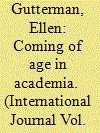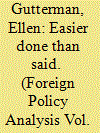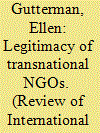|
|
|
Sort Order |
|
|
|
Items / Page
|
|
|
|
|
|
|
| Srl | Item |
| 1 |
ID:
154635


|
|
|
|
|
| Summary/Abstract |
Taking the view of International Relations (IR) as a socio-intellectual space conditioned by historical circumstances, and drawing on my personal reflections on international politics in the 1990s as a particularly important influence on my own professional and intellectual path in IR, this paper explores the 1990s as an exceptional period that shaped the decline of Canadian Foreign Policy as a field of study in Canadian IR. Bookended by the collapse of the Soviet Union and the end of the Cold War, at the beginning, and the start of the War on Terror at its finale, the 1990s can be read as an “optimistic interregnum” during which new possibilities arose for an inclusive, global transnationalism and the global governance of important problems. New ideas and new ways of conceptualizing IR through a global lens emerged. For Canadian students of IR in the 1990s, outward-looking globalism, transnationalism, cosmopolitanism, and theoretical eclecticism fit with the hopeful optimism of the times. In contrast, CFP—with its attendant requisite of policy relevance in service of Canadian national priorities—seemed inward-looking, parochial, and on the sidelines of important new intellectual currents and analyses.
|
|
|
|
|
|
|
|
|
|
|
|
|
|
|
|
| 2 |
ID:
137822


|
|
|
|
|
| Summary/Abstract |
The US Foreign Corrupt Practices Act of 1977 (FCPA) is having an unprecedented moment. In 2010, corporations paid $1.8 billion in FCPA fines, penalties, and disgorgements—the most ever recorded in this controversial Act's history and half of all criminal-division penalties at the Justice Department. While this recent pattern of enforcement is itself interesting, a deeper puzzle lies in the origins and early trajectory of the FCPA. Throughout the late 1970s and most of the 1980s, major US business groups opposed its unilateral ban on transnational bribery and lobbied the government to repeal this costly constraint on American businesses operating overseas. Yet, despite a decade of pressure from otherwise powerful groups, the government failed to respond to business demands amidst strategic trade concerns about the FCPA. Why? The paper applies a Constructivist lens, together with concepts from the theory of legal reasoning, to analyze the early history of the FCPA and explain its continued significance in US foreign economic policy. Anti-corruption norm resonance and the pressure publicly to justify norm-transgressing practices made foreign corrupt practices by American businesses “easier done than said.”
|
|
|
|
|
|
|
|
|
|
|
|
|
|
|
|
| 3 |
ID:
131712


|
|
|
|
|
| Publication |
2014.
|
| Summary/Abstract |
This article develops theoretical insights concerning the legitimacy of non-profit Transnational Non-Governmental Organisations (TNGOs) in global governance. The research compares the advocacy initiatives of Transparency International (TI), the leading TNGO in the international regime of anti-corruption, in Germany and France during the 1990s. The main argument is that the legitimacy of TNGOs is a relational concept: it is granted or denied in a relationship between at least two parties, in which actor attributes play a role but are not decisive. Only such a relational conception can explain why a given TNGO is granted legitimacy in one context and denied it in another. In addition, legitimacy matters. Although insufficient on its own, legitimacy is a necessary condition for effective advocacy, which TNGOs can generate endogenously. To the extent that the legitimacy of TNGOs depends on their acceptance by dominant groups and powerful decision-makers, therefore, 'legitimate' TNGOs may function to sustain rather than challenge the structures of power which condition global outcomes in ways that are often contrary to the goals of equality, fairness, and justice. Thus to assess the impact of TNGOs in global governance, one must examine which TNGOs have been granted (or denied) legitimacy and influence, and why.
|
|
|
|
|
|
|
|
|
|
|
|
|
|
|
|
|
|
|
|
|